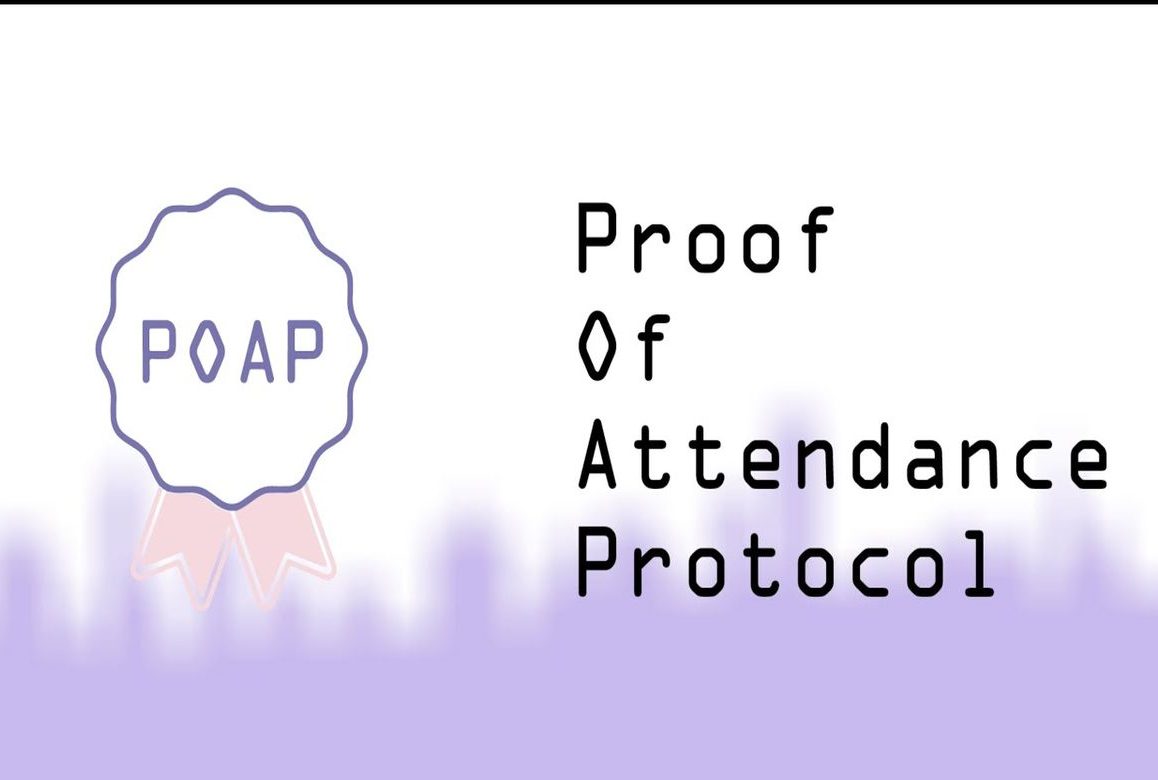Proof of Attendance Protocol (POAP) is described as a protocol that supports the secure and verifiable execution and transmission of data between two or more participants. POAP uses smart contracts on the Ethereum blockchain to manage event attendance, tradable event tokens, and reward distribution.
Notably, the cost of savings that is achieved by using the blockchain can enhance the event organizers’ general margins and profitability. Proof of Attendance was established in 2017 to address the challenges that plague the Proof of Work (PoW) consensus protocols.
The network is an open-source platform that lets developers build and precisely deploy decentralized applications (dApps) on secure, pre-established, low-cost, Ethereum-compatible smart contracts. Thus, the POAP protocol strives to encourage smaller and amateur events by enabling them to raise funds much easier than ever.
In this context, people can congregate for a common cause and pool their resources via smart contracts to put on an event. This strategy brings down costs for all parties involved and offers a better way for the event organizers who might not have adequate resources and experience to organize their events.
Proof Of Attendance Protocol (POAP) Overview
The Proof of Attendance Protocol (POAP) is a protocol that supports secure and authenticated transmission of data between parties. Some of the notable use cases of this protocol include verifying academic credentials, proving attendance at an event, and securing digital signatures to reduce the chances of hacking.
Analysts and experts believe that the Proof of Attendance Protocol is an ideal blend of the physical and digital worlds. Attendance at seminars, conferences, events, and other gatherings can now get recorded on a blockchain via a licensed application that is well-developed from this project.
Anyone who wants to attend any form of gathering where the POA Network app has been installed will be needed to show their face during the check-in process. Their attendance is then time-stamped on the blockchain via the application.
Related: Blockchain and the sharing economy
All data recorded on the POA Network is impenetrable and secured. Therefore, nobody can change or fake records on it due to its immutability. The app produces a QR code after every 10 minutes to represent the current state of all the activities and events that it is monitoring.
A public address with the corresponding QR code is then published in a space where event attendees can access it readily and with ease. All attendees can then use the QR code to check in to an event while on the go. That enables them to prove their attendance without needing any paper record.
Interestingly, the Proof of Attendance Protocol utilizes a simple initial coin offering (ICO) model that helps in funding more development and marketing activities. That model gets rid of the need for a traditional sale event that will need huge budgets, dedicated business developers, and many other resources.
The History Of POAP
In 2012, Dan Novaes came up with a great idea of a blockchain-based application that helps in rewarding users following the time that they spend at a particular event. The concept evolved into a decentralized protocol known as Proof of Attendance that is getting implemented by the POA Network team.
Proof of Attendance Protocols was first launched in 2019 at the ETH Denver Convention. At the time, the organizers of the event majorly relied on donations from different developers and influencers. They hosted a convention hackathon where many hackers participated. Every attendee was provided with a POAP as a reward for their participation. That is how POAP came up.
The decentralized nature of the Proof of Attendance protocol enables data to be sent and authenticated by an event organizer who then issues a digital certificate. The latter might feature more data like discount coupons, speakers’ acknowledgment, and any other relevant information.
Such form of registration is valid only during or after a given event, and it offers reliable proof that someone was physically present there. Using blockchain supports the creation of a decentralized public ledger that helps in the storage of immutable attendance data and it can never be changed or tampered with.
The protocol is entirely transparent, enabling users to validate the event that they have attended by browsing the ledger. Proof of Attendance network provides three solutions simultaneously.
First, there exists an open protocol that organizations and businesses can adopt to create a decentralized application (dApp). Secondly, the attendance monitoring and tracking services are available for use by the event organizers who can develop custom badges that help in the storage of digital proof of attendance data on private POA blockchains.
Related: 4 Blockchain Trends for 2022 and Beyond
Finally, the team has introduced TokenClub which is an automatic subscription-based service that sends event badges, tickets, and many other exclusive digital assets to the subscribers.
How Does POAP Work?
The attendees are allowed to create or join events using Android or IOS applications from their phones. These events are free to create. However, the event managers can charge for tickets if they want. Whenever you arrive at the event, open the application and scan a QR code or use your location data to check in.
This move generates an attendance record together with a timestamp that is securely stored on the Ethereum blockchain in a smart contract. A clear cryptographic identity can then be used to monitor and track all the attendees across the event to ensure that they do not have to go through the same process every time.
The participants are divided into three main categories:
- Event promoters – every event creator wants a lot of hype and attention at their event. The Proof of Attendance Protocol supports proof that the target market and audience are attending and proof that there are non-targeted individuals also attending. Promoters can need a target audience to develop a POAP record for their events by using the Custom Attestation feature. For instance, a video game convention might decide to incentivize gamers by rewarding the ones who check in with some tokens or other prizes that can only be redeemed at the event.
- Event Creators – they can readily use POAP to monetize the events by charging a fee or giving out prizes. This group is responsible for setting check-in rules and regulations that the smart contract enforces automatically. Event creators are needed to pay for event tickets using POA20 tokens, Ether, or any other ERC20 token via MetaMask. After payment, they can then share their event on social media and on the Eventum website and its affiliates to grow their audience.
- Event consumers – the attendees can use POA20 tokens as a form of currency at such events. These POA20 tokens are perfect for that purpose because they are not transferable during the event which means that nobody can take them from you after they have been paid for.
The Ethereum platform’s token model is being utilized by the Proof of Attendance Protocol (POAP) to offer incentives to the event promoters, creators, and attendees via different incentives to hold or spend the tokens. POAP is a dApp that is powered by the Ethereum blockchain and it uses the POA Network as its integral infrastructure.
Related: The Unconventional Guide to Ethereum
Notably, the POA Network consensus algorithm is the Proof-of-Authority (PoA), which is used to guarantee that all transactions are validated by only the approved accounts known as validators. Validators lock some of their tokens as a stake that helps in validating transactions.
POAP Use Cases
Proof of Attendance Protocol tokens can be utilized as incentives at different events and venues. It can track students who attend workshops, seminars, classes, and a lot more. Furthermore, they can help in tracking attendance to help prove which party is correct if any disputes come up later on.
POAP token utility spreads beyond participation in the POA events. Another notable use case of these tokens is receiving incentives, payments, and earning rewards within the POA protocol network. POAP has been well designed to solve various issues that surround reward distributions, event attendance, and provable records.
A good example is its use as a dependable incentive for all students who attend workshops, seminars, and classes. This model helps in motivating learners and encourages them to attend their classes more frequently, which resulted in enhanced retention rates for the firm that runs such seminars or workshops.
The POAP tokens are ERC20-compliant meaning that they can be readily linked with any Ethereum-based dApp.
Advantages Provided By POAP
The Proof of Attendance Protocol (POAP) comes with many benefits including:
- The POA Network is designed with an immutable data storage system that cannot be manipulated by any third parties. It is believed to be a great tool for identity management and tracking systems that will soon benefit many institutions and organizations.
- The protocol makes it quite easy for people to prove that they attended events and gatherings without needing to walk around with or provide any form of documentation or records.
- It enables the event organizers to quickly and easily track attendees. The information that they gather can be used for promotion, marketing, and other purposes.
The Takeaway
The Proof of Attendance Protocol is a decentralized application (dApp) designed to authenticate the proof of attendance for an event. Conferences, universities, venues, and businesses can utilize the tokenized protocol as a better alternative compared to plastic and paper badges. It is successfully fulfilling its target of preventing fraud and double voting.











